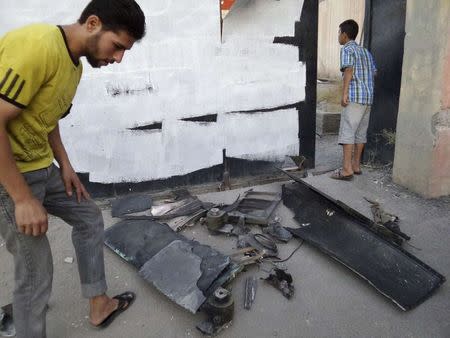Syria says U.S. told it of attack on Islamists hours before raids

By Mariam Karouny and Laila Bassam BEIRUT (Reuters) - Syria said on Tuesday that U.S. Secretary of State John Kerry had told the Damascus government in a letter delivered by Iraq that the United States and its allies were going to attack Islamic State in Syria, hours before air strikes took place. The United States denied Kerry had sent a letter to Syria, but confirmed that Washington's envoy to the United Nations had told her Syrian counterpart that air strikes would take place. Damascus, which had said any air strikes on Syria must have its approval, did not condemn the attacks. They were launched by the United States with the help of Gulf states and Jordan against Islamic State and al Qaeda-affiliated militants. A Syrian analyst interviewed on the tightly controlled Syrian state television said the air strikes did not amount to an act of aggression because the government had been notified in advance. In a government statement read out on state TV, the Syrian foreign ministry said Syrian Foreign Minister Walid al-Moualem had received a letter from Kerry through Iraq, whose Shi'ite-led government is a close ally of Damascus. "The foreign minister received a letter from his American counterpart via the Iraqi foreign minister, in which he informed him that the United States and some of its allies would target (Islamic State) in Syria," the Syrian foreign ministry said in the statement. "That was hours before the raids started." In the statement, Damascus vowed to keep up its own campaign against Islamic State, which has seized large areas of northern and eastern Syria and in northern and western Iraq. It said it would continue to target the group in areas hit in the U.S.-led raids on Tuesday. The United States has shunned Syrian President Bashar al-Assad, describing him as part of the problem in the region. "We warned Syria not to engage U.S. aircraft. We did not request the regime's permission. We did not coordinate our actions with the Syrian government," U.S. State Department spokeswoman Jen Psaki said in a statement. "We did not provide advance notification to the Syrians at a military level, or give any indication of our timing on specific targets." Russia, one of Assad's major allies, criticised the U.S.-led strikes, saying they should have been agreed with Damascus. President Hassan Rouhani of Iran, another of Assad's major backers, neither condemned nor endorsed the military action. Speaking to senior editors ahead of the annual gathering of world leaders at the U.N. General Assembly, he said military action lacked "legal standing" without a U.N. mandate or a request from the government of the affected country. Robert Mardini, an official with the International Committee of the Red Cross, said: "We have information that the Syrian government acknowledged the fact that they were notified about the strikes. But this does not amount to a consent or no consent. "But it is important for us and it is clear that whatever military operation is being undertaken, rules and principles of international humanitarian law are fully applicable and have to be respected at all times," Mardini, who is head of Red Cross operations for the Near and Middle East, told Reuters Television. "THERE IS A COMMON ENEMY" The Syrian government statement highlight Iraq's capacity to act as a channel for indirect contact between Damascus and Washington, even as the United States and its allies shun Assad. Iraq's national security adviser briefed Assad on efforts to fight Islamic State last week, the first such meeting since the United States began air strikes against Islamic State in Iraq. Faleh al-Fayad, the Iraqi national security adviser, was back in Damascus on Tuesday, briefing Assad on the next steps "in efforts to combat terrorism", Syrian state media reported. The Syrian government said coordination with Iraq was "at its highest levels" and reiterated its willingness to be part of international efforts to combat Islamic State. "Syria confirms that it has fought and continues to fight (Islamic State) in Raqaa and Deir al-Zor and other areas," the statement said. "It has not and will not stop fighting the organisation in cooperation with states directly harmed by it - most importantly with Iraq," the government statement said. A senior Lebanese politician with close ties to the Syrian government said the Syrian statement also suggested U.S. coordination with Damascus, though the United States would not be able to publicly say that was happening. "It is certain that if these air strikes are serious, they will strengthen the enemies of (Islamic State), at the forefront of whom is the Syrian regime," said the politician. The analyst interviewed on Syrian state TV said the notification meant the air strikes were neither an act of aggression nor an infringement of Syrian sovereignty. "All the targets and warplanes were monitored by the Syrian air defence," said the analyst, Ali al-Ahmad. "This does not mean we are part of the joint operations room, and we are not part of the alliance. But there is a common enemy." Assad's opponents have accused him of deliberately allowing Islamic State to emerge as a threat so that it could fight his more moderate opponents and bolster his narrative that the entire opposition are all Islamic extremists. "It’s not the act of striking (Islamic State) that strengthens Bashar. The trap that he wants us to fall into, is that he is recognised as a partner in the fight against terrorism," said a French diplomatic source. (Addditional reporting by Sylvia Westall/Tom Perry in Beirut and John Irish in Paris; Writing by Tom Perry; Editing by Peter Millership and Sophie Walker, Larry King)

